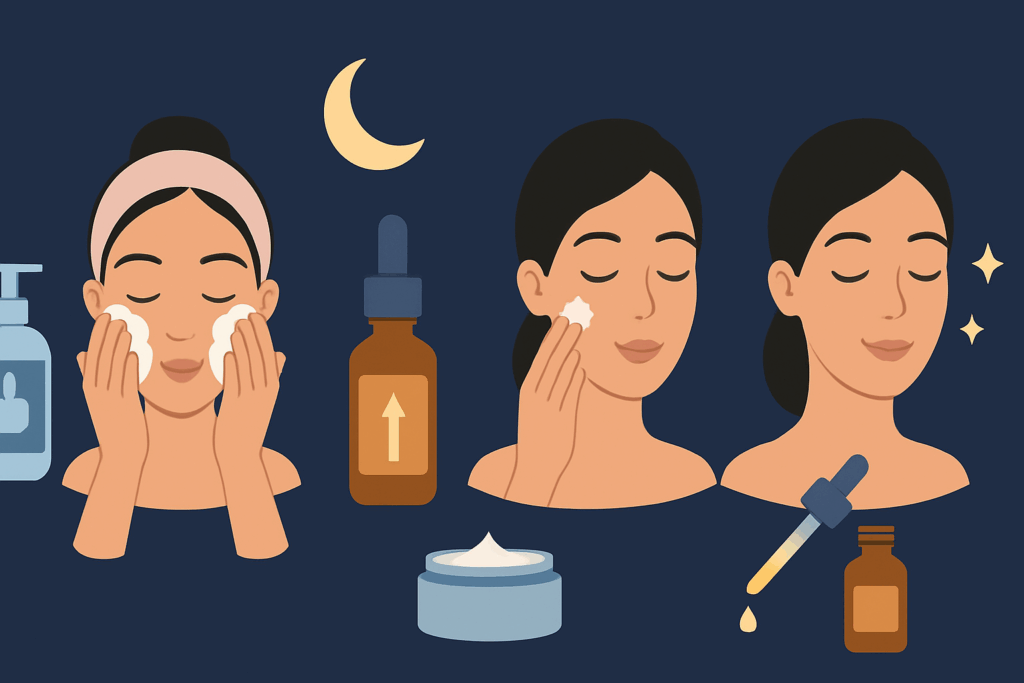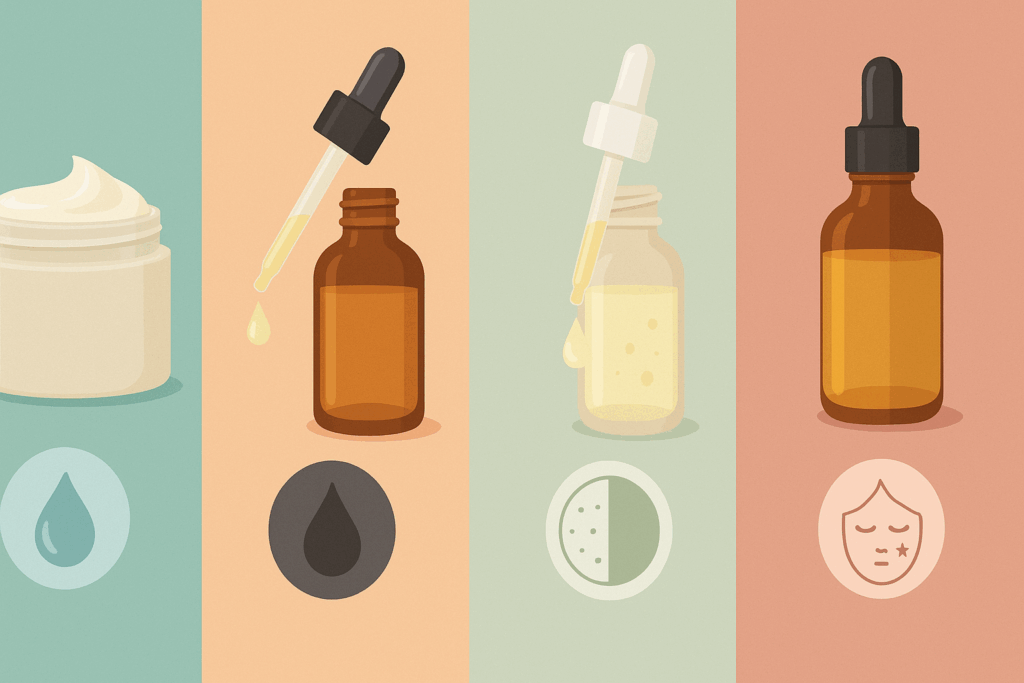Introduction
A well-structured nighttime skincare routine with retinol is a transformative step toward achieving youthful, radiant skin. As we sleep, our skin enters a state of repair and rejuvenation, making nighttime the perfect opportunity to target fine lines, wrinkles, and dullness. Retinol, a derivative of Vitamin A, is celebrated for its powerful anti-aging properties and its ability to accelerate cell turnover. Integrating retinol into your nighttime regimen not only smooths out fine lines but also helps fade hyperpigmentation and refines skin texture. However, the key to unlocking its full potential lies in understanding the right steps, products, and techniques that make a nighttime skincare routine truly effective. In this guide, we will walk through the essential components of a structured nighttime skincare regimen, with retinol as the star ingredient.
You may also like: How to Tighten Loose Skin After Weight Loss: Science-Backed Strategies for a Firmer, Healthier You

The Importance of a Nighttime Skincare Routine
Your skin works hardest while you sleep, repairing and regenerating cells at a faster rate than during the day. This makes the nighttime the ideal period for potent treatments like retinol to work without interference from UV exposure. A structured nighttime routine not only enhances the efficacy of your skincare products but also supports the skin’s natural renewal process. Cleansing, treating, and moisturizing become pivotal steps that prepare your skin for optimal absorption and healing. Incorporating retinol in the right sequence, alongside complementary products, amplifies its benefits, allowing you to wake up to smoother, more youthful-looking skin.

Why Retinol Is the Star of Your Nighttime Routine
Retinol stands as the gold standard in anti-aging skincare, with decades of research supporting its effectiveness. As a derivative of Vitamin A, it penetrates deep into the dermis, accelerating cell turnover and boosting collagen production. This not only reduces fine lines and wrinkles but also fades dark spots and improves skin texture. When used as part of a nighttime skincare routine with retinol, the skin is able to heal and regenerate more efficiently, enhancing its smoothness and clarity over time. Retinol’s ability to promote cellular regeneration makes it particularly effective for mature skin, as well as those struggling with acne scars and uneven pigmentation.
Moreover, retinol strengthens the skin’s barrier, which is crucial for retaining moisture and defending against environmental stressors. Its exfoliating properties ensure that dead skin cells are regularly shed, preventing clogged pores and dullness. However, its potency also means that it should be introduced gradually, especially for those with sensitive skin. Understanding how to apply it correctly and pairing it with the right products is key to avoiding irritation and maximizing results.

The Essential Steps for a Perfect Nighttime Skincare Routine
Building the best nighttime skincare routine starts with understanding the order and purpose of each step. The correct application not only enhances product absorption but also prevents irritation, particularly when using potent ingredients like retinol. Below, we explore the crucial steps that make up an effective nighttime regimen:
- Cleanse Thoroughly: Begin with a gentle cleanser that effectively removes makeup, dirt, and excess oil without stripping the skin’s natural moisture. Opt for formulas that are sulfate-free and pH-balanced to maintain the skin’s barrier.
- Exfoliate (Optional, Once or Twice a Week): If your skin can tolerate it, gentle exfoliation helps to clear away dead skin cells, making it easier for retinol to penetrate deeper layers of the skin.
- Apply Retinol: After cleansing and optional exfoliation, apply your retinol product. Start with a pea-sized amount, spreading it evenly across your face while avoiding the delicate eye area. Allow it to absorb fully before moving on to the next step.
- Moisturize Generously: Retinol can be drying, so follow up with a hydrating, non-comedogenic moisturizer to lock in moisture and prevent flakiness.
- Apply Eye Cream: The area around the eyes is particularly sensitive. Use a nourishing eye cream to hydrate and protect this delicate skin.
- Seal with a Facial Oil (Optional): For those with dry skin, a lightweight facial oil can provide an added layer of hydration, ensuring your skin remains plump and soft overnight.
- Consider Overnight Masks: Once or twice a week, incorporating an overnight mask can boost hydration and enhance the benefits of your nighttime skincare routine.

Choosing the Right Retinol for Your Skin Type
Not all retinol products are created equal, and finding the right one for your skin type is crucial. For beginners or those with sensitive skin, starting with a lower concentration (like 0.25% or 0.3%) can help your skin adjust to its powerful effects. More experienced users might opt for 0.5% or even 1% formulations to see enhanced results. Additionally, choosing a formulation that includes soothing ingredients like hyaluronic acid, glycerin, or ceramides can mitigate dryness and irritation.
For those with oily or acne-prone skin, a retinol serum might be the best option as it absorbs quickly without adding excess moisture. Conversely, people with dry or mature skin might benefit more from cream-based retinol products that deliver additional hydration. Understanding your skin’s unique needs will help you select a product that works harmoniously with your nightly regimen, ensuring smoother, brighter skin without unwanted side effects.

The Role of Hydration in Your Nighttime Skincare Routine
Hydration is an essential component of any skincare routine, especially when using potent actives like retinol. Proper hydration not only plumps the skin but also enhances its ability to repair and regenerate. During the night, your skin loses moisture through transepidermal water loss (TEWL), making it imperative to lock in hydration before sleeping. Applying a rich moisturizer after your retinol treatment ensures that your skin remains supple and resilient, minimizing the risk of flaking or irritation.
Incorporating hydrating serums with ingredients such as hyaluronic acid or glycerin can further enhance moisture retention. These humectants draw water into the skin, keeping it hydrated throughout the night. Layering these serums before your moisturizer can help to maximize their benefits, ensuring that your nighttime skincare routine leaves your skin looking refreshed and rejuvenated by morning.
Understanding the Nighttime Skincare Routine with Retinol and Its Long-Term Benefits
A consistent nighttime skincare routine with retinol delivers cumulative benefits over time. With regular use, skin appears more even-toned, smoother, and visibly brighter. Fine lines soften, dark spots fade, and the overall texture becomes more refined. The regenerative process facilitated by retinol also boosts elasticity, which helps skin remain resilient as it ages.
FAQ: The Essential Nighttime Skincare Routine with Retinol
What Makes a Nighttime Skincare Routine with Retinol So Effective?
A nighttime skincare routine with retinol is exceptionally effective because it capitalizes on the skin’s natural regeneration process during sleep. While we rest, the skin’s repair mechanisms work more efficiently, allowing retinol to penetrate deeply and accelerate cell turnover. This enhanced cellular renewal helps fade dark spots, smooth fine lines, and improve overall texture. Retinol’s potent anti-aging properties are further amplified when used in conjunction with hydrating products that seal in moisture and protect the skin barrier. Over time, consistent use transforms the skin, making it visibly smoother, firmer, and more radiant.
Can I Use Retinol Every Night in My Bedtime Skincare Steps?
Integrating retinol into your bedtime skincare steps requires a gradual approach, especially if you are new to this ingredient. For beginners, dermatologists often recommend starting with two to three nights per week to allow your skin to acclimate. As your skin builds tolerance, you can increase the frequency to nightly applications. Consistency is crucial for visible results, but overuse can lead to dryness or irritation. To optimize your results, follow your retinol application with a hydrating moisturizer to maintain skin balance and prevent flakiness.
How Do I Build the Best Nighttime Skincare Routine for My Skin Type?
Creating the best nighttime skincare routine involves understanding your skin type and choosing products that complement retinol’s potent effects. For dry or sensitive skin, pairing retinol with a nourishing moisturizer rich in ceramides and hyaluronic acid can prevent irritation. If you have oily or acne-prone skin, opt for a lightweight, oil-free serum before retinol application to prevent clogged pores. Additionally, using a gentle cleanser that does not strip your skin’s natural oils is essential for maintaining balance during the night. This structured approach ensures maximum absorption and minimal irritation.
Are There Specific Nighttime Skin Care Products That Work Best with Retinol?
Yes, certain nighttime skin care products can significantly enhance the efficacy of retinol. Hydrating serums with hyaluronic acid, glycerin, or squalane provide deep moisture that counters the dryness retinol may cause. Additionally, barrier-repair creams with ingredients like ceramides and peptides help fortify the skin’s protective layer. For those who want to target specific concerns, antioxidants like Vitamin C serums can be applied in the morning to boost retinol’s anti-aging benefits at night. Selecting non-comedogenic and fragrance-free products helps to minimize irritation while maximizing results.
What Is the Best Nighttime Skincare Routine with Retinol for Dry Skin?
For individuals with dry skin, the best nighttime skincare routine with retinol focuses heavily on hydration and moisture retention. Begin with a gentle, hydrating cleanser that preserves your skin’s natural barrier. Follow this with a lightweight serum containing hyaluronic acid to plump the skin with moisture. After applying retinol, seal in hydration with a rich, non-comedogenic moisturizer, and consider using a facial oil as the final step to prevent moisture loss overnight. This routine ensures that the powerful effects of retinol are balanced with deep hydration, reducing the risk of dryness or irritation.
How Can I Layer My Products for the Best Night Time Routine for Face?
Layering products effectively is crucial for the best night time routine for face care. Start with the thinnest formulas first, such as toners or essences if used, followed by serums. Apply retinol next, allowing it to absorb completely before moving on to heavier creams or oils. Always finish with a moisturizer to lock in hydration. This sequential application not only maximizes absorption but also minimizes potential irritation, particularly when using powerful actives like retinol.
Can Retinol Be Combined with Other Nighttime Beauty Routine Products?
Yes, retinol can be combined with other products in your nighttime beauty routine, but with caution. Avoid using exfoliating acids like AHAs or BHAs on the same nights as retinol to prevent over-exfoliation and irritation. Instead, opt for hydrating serums and nourishing moisturizers that support skin repair. If you want to use Vitamin C, it is best applied during your morning routine, while retinol remains the star of your night care essentials. Balancing these potent ingredients ensures optimal results without compromising your skin barrier.
How Long Does It Take to See Results from a Nighttime Skincare Routine with Retinol?
Visible results from a nighttime skincare routine with retinol typically begin to show after four to six weeks of consistent use. Early improvements include smoother texture and increased hydration, while long-term benefits such as reduced fine lines and faded hyperpigmentation become apparent after three to six months. Patience is key, as retinol works on a cellular level to renew skin gradually. To maintain progress, regular application as part of your bedtime skincare steps is essential.
Is It Necessary to Use a Moisturizer in My Night Skin Treatment
Yes, moisturizing is a crucial part of any night skin treatment, especially when using retinol. Retinol accelerates cell turnover, which can sometimes lead to dryness or flakiness. Applying a rich, hydrating moisturizer immediately after retinol helps to lock in moisture and support the skin barrier. For even better hydration, consider using a serum with hyaluronic acid or glycerin before your moisturizer. This step not only prevents irritation but also enhances the overall effectiveness of your nighttime skin care order.
What Are the Long-Term Benefits of Following a Nighttime Skincare Routine with Retinol?
The long-term benefits of following a nighttime skincare routine with retinol are extensive and scientifically proven. Regular use promotes collagen production, reduces fine lines, and refines skin texture. Over time, it also diminishes dark spots and evens out skin tone, contributing to a more youthful appearance. When paired with proper hydration and sun protection during the day, the improvements are not only visible but lasting. This commitment to nightly care ensures your skin remains resilient, radiant, and healthy for years to come.
Conclusion
Integrating a well-structured nighttime skincare routine with retinol into your daily regimen is a powerful step toward achieving lasting, radiant skin. As retinol works to accelerate cell turnover, diminish fine lines, and improve skin texture, its transformative effects become more evident over time. Coupled with proper hydration and mindful product layering, your skin can effectively repair and rejuvenate while you rest. Consistency and patience are key, as the long-term benefits of retinol are truly revealed with continued use. By committing to this nightly ritual, you are investing in the health and beauty of your skin, ensuring it remains vibrant, youthful, and resilient for years to come.
Further Reading:
5 step night time routine for beautiful skin
How to Build a Custom Nighttime Skincare Routine With The Ordinary
The Perfect Nighttime Skincare Routine, According to Dermatologists